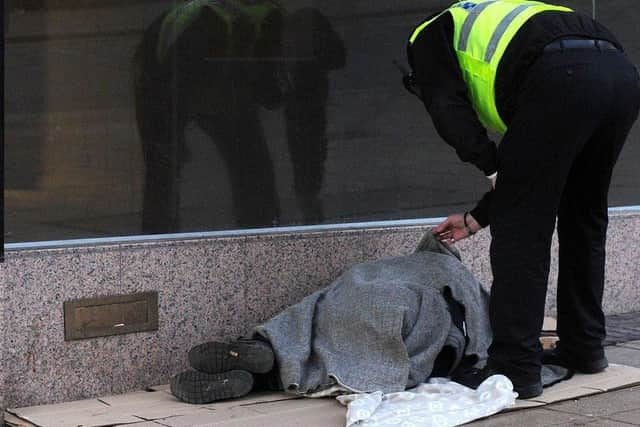Six months on since Sheffield's rough sleepers were placed in emergency accommodation during pandemic - where are they now?
and live on Freeview channel 276
Almost six months has passed since the end of the ‘Everyone In’ plan to house people on the streets in hotels in a bid to protect them from Covid.
Measures to protect the homeless also led to the creation of First Housing, a scheme to offer up to 50 homes to long term rough sleepers, in the hope that their time indoors would inspire them to get off the streets for good.
Advertisement
Hide AdAdvertisement
Hide AdBut Sheffield Chamber of Commerce’s managing director, Alexis Krachai, said rough sleeping, begging and anti-social behaviour are issues common in towns and cities across the country and remain a problem in Sheffield.


“Anybody in Sheffield city centre right now will be struck by rough sleeping, begging and anti-social behaviour,” he said.
“That’s not unique to Sheffield. We’re seeing that in towns and cities up and down the country.
“We have to represent the best interests of businesses and hold authorities accountable, and there are two issues that we’ve got to be honest about; the state of the economy that is leading people to see no way out of addiction and homelessness; and secondly how police and local councils have suffered huge budget cuts in the past 10 years, that mean we have lost services that stop people slipping through the net.
Advertisement
Hide AdAdvertisement
Hide Ad“It’s no good pointing fingers. It’s up to us as a city - as businesses and the chamber, the police, the local authorities and the charities - to work together. I believe people in this situation now have little choice but to turn to the voluntary sector for help.”
Sheffield City Council says the city currently has between eight and 25 rough sleepers - but this is estimated using data from before the pandemic. At time of writing, the council was also unable to provide figures on where those 196 people who were housed during the ‘Everyone In’ are today.
Mr Krachai believes it is up to Sheffield to work around the cuts and pressures from central Government.
He also champions ‘Sheffield Business Together’, an organisation inviting businesses to collaborate with charities to tackle social issues.
Advertisement
Hide AdAdvertisement
Hide AdBut when The Star asked the voluntary sector if they were the only place rough sleepers could turn to, the voluntary sector disagreed.
“Before and after the pandemic, Sheffield has always had a great multi-agency approach to homelessness,” says Andy Parkinson, service manager for the Salvation Army.
“It might not look like it to people passing on the street, but there is great, great work being done, both before the pandemic and now.”
To Andy, Sheffield is already benefiting from a partnership of charities and authorities trying to move rough sleepers on from the streets. In the past year, he says some of the city’s most deeply entrenched homeless people have now moved on to their own accommodation because of work during the pandemic.
Advertisement
Hide AdAdvertisement
Hide Ad“I can think of two clients who have been out of service for a long, long time who both came to use during the crisis,” said Andy.
“After a small amount of stability in the hotels they have now both moved into their own properties through the council’s Housing First initiative.
“From our perspective it’s been a challenging time but we’ve seen a lot of positive outcomes with some really experienced people in the local authority thinking outside the box on how to tackle the issue.”
Councillor Paul Wood, Sheffield City Council’s executive member for housing, said: “People who regularly sleep rough in the city centre are usually known to Sheffield’s partnership of agencies. Every week we meet with people who are already working with those individuals and who have some knowledge of their personal circumstances.
Advertisement
Hide AdAdvertisement
Hide Ad“The group shares vital information and agrees a carefully coordinated action plan for each individual. We aim to improve the chances of supporting people away from the street and into accommodation.
“Thanks to the excellent work of this partnership, we haven’t had to issue any public space protection orders relating to rough sleeping or begging in the last year. We have the processes in place, but we get better results through our partnership approach to helping people.”
Comment Guidelines
National World encourages reader discussion on our stories. User feedback, insights and back-and-forth exchanges add a rich layer of context to reporting. Please review our Community Guidelines before commenting.